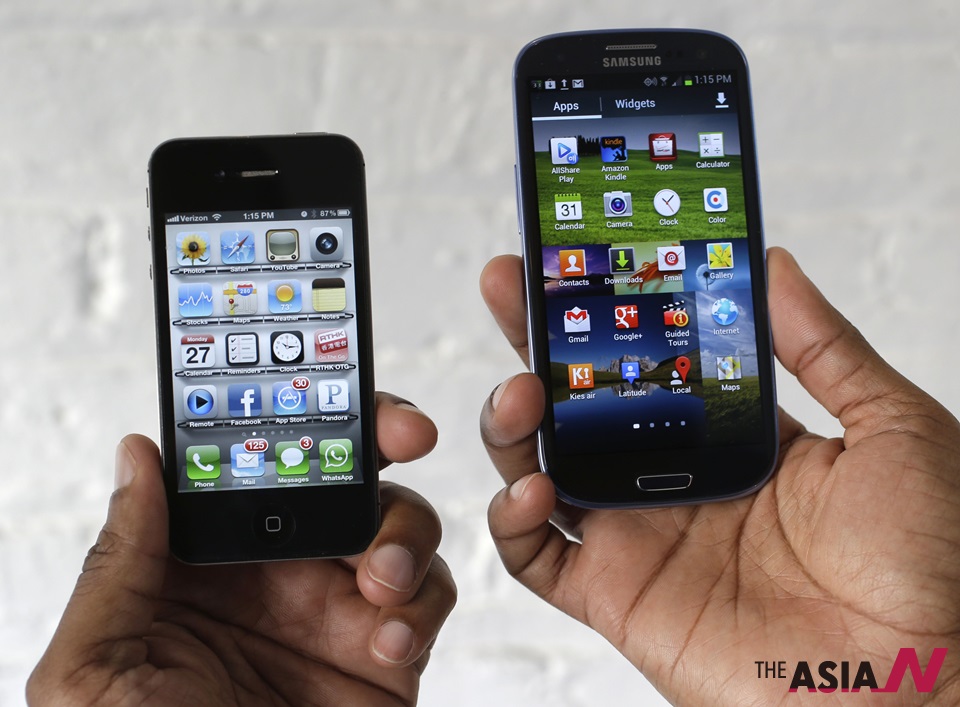
Samsung, Microsoft restore relations
Ultimately, there are no enemies or friends among businesses as they pursue partnerships to advance their own interests according to market situations.
“Frenemies,” an urban term that describes people who are both friends and enemies, is a more appropriate word choice for companies’ relationships with each other.
Backed by the full support of Google, Samsung Electronics became the world’s biggest smartphone producer and is a representative of the so-called Google Android Software alliance at the expense of Microsoft (MS).
MS, another long time ally of Samsung, was forced to remain in the backseat because of its less powerful mobile phone operating system.
The Samsung-Google partnership is going strong, with the two companies working together to address their global patent disputes with Apple and sharing confidential data in some confidential Google projects.
However, Samsung is still working with MS to diversify its software-sourcing channel and to get substantial help in cloud computing and mobile security systems.
“A new era of detente is coming between Samsung and MS. As MS is strengthening it consumer business not just by selling its Windows licensing, it needs Samsung’s support in mobile devices, while Samsung needs MS’ support in mobile security and cloud computing,” said an official at Samsung Electronics who declined to be named.
“The Samsung-MS partnership, which deteriorated when Samsung started working with Google, is seeing signs of recovery,” he added.
The Windows Phone is performing well in the mobile devices segment.
Google’s Android and Apple’s iOS still rule the segment, but if a third viable operating system emerges, it might be from MS, according to the Samsung official and others industry insiders.
Last year, MS was the No. 3 mobile platform provider with Windows, capturing 3.3 percent of the market, up from the previous year’s 2.4 percent, data from market intelligence firm IDC showed. Google Android took 79 percent followed by Apple iOS, which took 15.2 percent.
While Samsung intends to increase the budget for its mobile lineup, the demand for less-pricey phones will rise, meaning that if MS supports Samsung, the Korean company will have more opportunities to improve profitability by selling its handsets through MS’ distribution channels.
MS recently acquired Nokia’s mobile division in hopes of getting the Windows Phone off the ground. Accordingly, MS will start offering incentives for smartphone vendors to produce Windows Phones.
News reports have said Samsung will get $1.2 billion from MS this year for research and a co-promotional campaign. Spokespersons from Samsung and MS Korea declined to comment on this information.
“We see that the Windows mobile phone is gaining traction and getting a positive response especially in the low-end market. The market for smartphones is approaching saturation,” said another Samsung official.
“One key question is how Samsung will respond to such changing business situations in a timely manner. For that, utilizing MS’ distribution channels in emerging markets looks lucrative,” he added.
Samsung is currently developing a series of devices that run on the latest Windows mobile platform. LG Electronics is also launching mobile devices in the latter half of this year.
“We are working on it,” said the Samsung official.
The improving ties between Samsung and MS are also because of Samsung’s commitment to its Knox mobile security patch management and a cloud computing system, said officials.
Samsung believes the business-to-business (B2B) segment is less volatile and has higher growth potential than the business-to-consumer (B2C) segment, which usually moves with market situations.
To that end, Samsung is promoting the Knox system, an end-to-end security product that enables companies to confidently use Samsung’s Android devices.
Knox creates a secure area in devices and puts containers around Android apps. It protects business data without interfering with users’ activities, according to the Samsung official.
“Samsung is targeting the corporate B2B market. We are teaming up with MS for Knox,” said another Samsung official.
Samsung and MS recently struck a deal for Knox and Windows Server 2012 R2 that should make it easier to put Galaxy Android devices on the corporate network.
This partnership could be what Samsung needs to get more Galaxy devices in enterprises, starting with organizations running Windows Server 2012 R2.
The two companies are also teaming up on cloud printing to enable Samsung users to print documents from their smartphones on a service backed by Windows Azure and SharePoint.
“Samsung wants to boost the partnership in cloud computing-related businesses. New announcements will be released,” said an industry official who declined to be named.
Officials from MS Korea and Samsung declined to confirm this information.
“It’s interesting to see that Samsung is resuming its partnership with MS especially in mobile, cloud computing and Knox, amid its increased motivation to cut its reliance on Google.” By Kim Yoo-chul, The Korea Times




